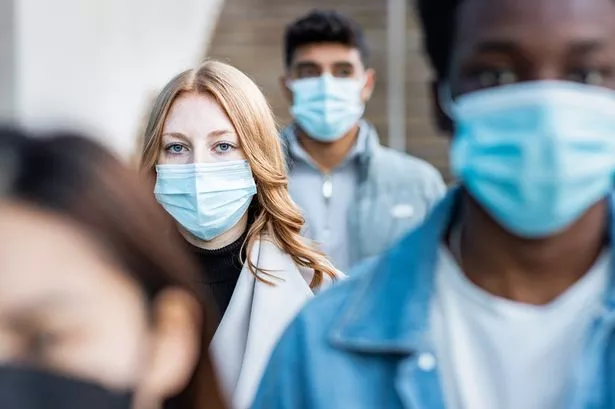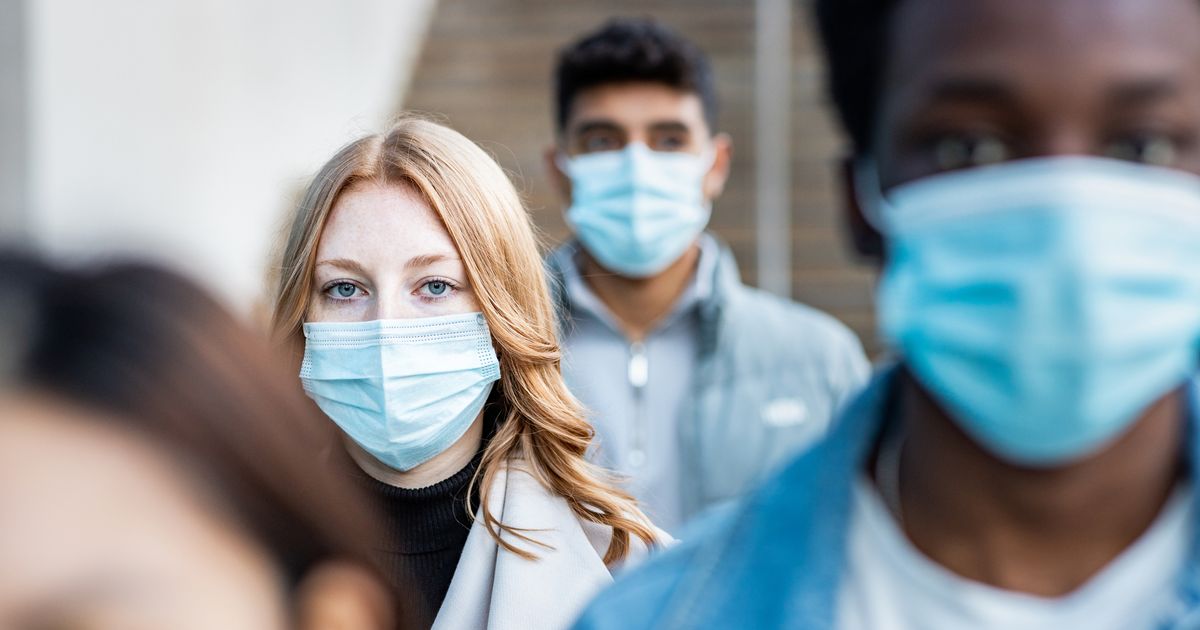During the colder months it is easier for the flu and viruses to spread, leaving the vulnerable at risk. Health officials are urging Brits to wear face masks outside if they have these three symptoms.(Image: Getty Images)
Health officials are urging Brits to wear face masks outside if they have these three symptoms.(Image: Getty Images)
Scots who display any of the three key flu or Covid symptoms are being urged to wear a face mask while out and about to help limit the spread of winter viruses.
While many people may enjoy the autumn and winter seasons due to its flavoured drinks, warm clothing and cold weather, the festive season can drag many of us down as viruses begin to rise.
People across the UK are more likely to catch Covid or the flu in the colder months due to many of us spending more time inside. While some may think that being indoors will ward off cold and flu, all it takes is one person in your household to catch a virus and it will then spread like wildfire.
The latest data from the UK Health Security Agency (UKHSA) has shown flu cases are already rising early in the season, with a quick acceleration expected in the coming weeks, reports the Express.
 The UKHSA is urging those over 65, pregnant or have a health condition to get a flu jab.(Image: Getty Images)
The UKHSA is urging those over 65, pregnant or have a health condition to get a flu jab.(Image: Getty Images)
As a result of this steady climb, the UKHSA is urging everyone who is over the age of 65, pregnant or has a long-term health condition to get a flu jab to help prevent them becoming seriously ill over the festive period.
On top of this, to try and halt the spread of flu and viruses this winter, health officials are also recommending that anyone who experiences any of three key Covid or flu symptoms to wear a mask while outside.
These three symptoms include a high temperature, a cough, and feeling tired or achy. By wearing a mask, this should help prevent the virus from spreading to others.
Additionally, it is recommended that those with the flu or Covid should stay at home until you are feeling better to help minimise contact.
Other symptoms of these viruses also include a headache, sore throat, loss of appetite, nausea, diarrhoea and a blocked or runny nose.
 Brits should wear a mask outside if they are extra tired/achy, have a cough or a high temperature.(Image: Getty Images)
Brits should wear a mask outside if they are extra tired/achy, have a cough or a high temperature.(Image: Getty Images)
In the UKHSA’s latest winter surveillance bulletin, Dr Jamie Lopez Bernal, consultant epidemiologist at UKHSA, said: “Flu continues to increase among younger people despite the school half-term break.
“We expect the holidays gave flu a ‘firebreak’ and dampened the spread, but we do now expect to see further increases as people return to school and work.
“With this upward trend continuing, it’s more important than ever that those eligible for a free flu vaccine come forward. Vaccination remains the most effective way to protect yourself from serious illness and hospitalisation.”
He added: “Eligible groups can book their appointment through the NHS national booking system and parents should ensure school consent forms are completed or GP appointments are booked for younger children.
“Anyone with flu or COVID-19 symptoms – including high temperature, cough, and feeling tired or achy – should minimise contact with others, especially those who are vulnerable. If you need to go out with symptoms, consider wearing a face covering, wash hands regularly and ensure indoor spaces are well ventilated.”
For those unsure if they are eligible for a free flu vaccine this year, the NHS recommends that people with any of the following health conditions should book an appointment:
conditions that affect your breathing, such as asthma (needing a steroid inhaler or tablets), chronic obstructive pulmonary disease (COPD) or cystic fibrosisheart conditions, such as coronary heart disease or heart failurechronic kidney diseaseliver disease, such as cirrhosis or hepatitissome conditions that affect your brain or nerves, such as Parkinson’s disease, motor neurone disease, multiple sclerosis or cerebral palsydiabetes or Addison’s diseasea weakened immune system due to a condition such as HIV or AIDS, or due to a treatment such as chemotherapy or steroid medicineproblems with your spleen, such as sickle cell disease, or if you’ve had your spleen removeda learning disabilitybeing very overweight – a body mass index (BMI) of 40 or above
If your health condition is not included in the above list, it is advised that you speak to your GP surgery to find out your options.
Join the Daily Record WhatsApp community!
Get the latest news sent straight to your messages by joining our WhatsApp community today.
You’ll receive daily updates on breaking news as well as the top headlines across Scotland.
No one will be able to see who is signed up and no one can send messages except the Daily Record team.
All you have to do is click here, select ‘Join Community’ and you’re in!
We also treat our community members to special offers, promotions, and adverts from us and our partners. If you don’t like our community, you can check out any time you like.
To leave our community click on the name at the top of your screen and choose ‘exit group’.
If you’re curious, you can read our Privacy Notice.

